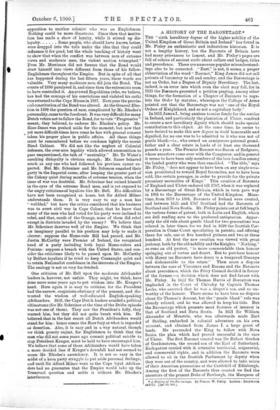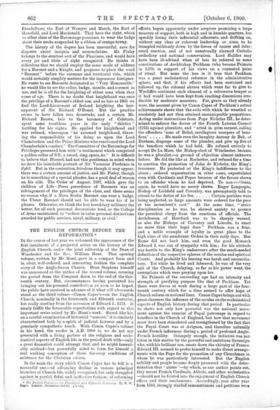A HISTORY Or THE BARONET.A.,GE.*
THE " sixth hereditary degree of the higher nobility of the United Kingdom of Great Britain and Ireland" has found in Mr. Pixley an enthusiastic and industrious historian. It is not a lengthy history, but the Baronets of Britain have had many grievances to lament, and Mr. Pixley's pages are full of echoes of ancient strife about collars and badges, titles and precedence. There are numerous popular misunderstand- ings also to be corrected. ." Bart." is not, it seems, a proper abbreviation of the word " Baronet," King James did not sell patents of baronetcy to all and sundry, and the Baronetage is not an Order, but a Degree of Dignity Hereditary. The last, indeed, is an error into which even the elect may fall, for in 1835 the Baronets presented a petition praying, among other things, for the formation of a Chapter of Baronets to regu- late the Order by statutes; whereupon the College of Arms pointed out that the Baronetage was not "one of the Royal Orders of Knighthood, and so not a capitulary body."
In 1611 James I., being anxious to raise funds for the service in Ireland, and particularly the plantation of, Ulster, resolved to create a new hereditary dignity which should make special contribution to this object. At the same time, he seems to have desired to make this new degree in itself honourable and dignified, for no one was to be admitted to it who was not of gentle blood,—i.e., who owned an armigerous paternal grand. father and a clear estate in lands of at least one thousand pounds a year. The Premier Baronet was Bacon of Redgrave, whose ancestors came over with the Conqueror, and in general it seems to have been only members of the best families among the landed gentry who were thus ennobled. "The title," says Mr. Pixley, "does not appear to have been on any single occa- sion prostituted to reward Royal favourites, nor to have been sold, like certain peerages, in order to provide for the private pecuniary necessities of Kings." This creation of Baronets of England and Ulster endured till 1707, when it was replaced by a Baronetage of Great Britain, which in turn gave way in 1801 to the Baronetage of the United Kingdom. Mean- time, from 1618 to 1801, Baronets of Ireland were created, and between 1625 and 1707 Scotland had the Baronets of Scotland and Nova Scotia. Mr. Pixley points out at full length the various forms of patent, both in Latin and English, which are dell reading save to the professed antiquarian. Appar- ently the old rule about gentle blood for two generations was relaxed in later times, for we find in 1688 the Scottish Cor- poration in Crane Court speculating in patents, and offering three for sale, one at five hundred guineas and two at three hundred. At first the new creation was viewed with great jealousy, both by the old nobility and the Knights. "Nothing," so runs an old protest, "is more commendable than honour springing out of vertue and desert. But to purchase honour with Money (as Baronets have done) is a temporall Simcnye and dishonorable to the estate." Then arose a dispute between the sons of Viscounts and Barons and the Baronets about precedence, which the Privy Council decided in favour of the former,—a decision which does not find favour with Mr. Pixley. In 1622 Sir Thomas Harris of Boreatton was impleaded ;n the Court of Chivalry by Captain Thomas Lecke, who asserted that be was a draper's son, and so un- worthy of the honour. There seems to have been no dispute about Sir Thomas's descent, but the "gentle blood" rule was already relaxed, and he was allowed to keep his title. But the Baronetage which presents most features of interest is that of Scotland and Nova Scotia. In 1621 Sir William Alexander of Menstrie, who was afterwards made Earl of Stirling, embarked in colonial adventure on his own account, and obtained from James L a large grant of lands. He persuaded the • King to follow, with Nova Scotia the plan which had proved successful in the case of Ulster. The first Baronet created was Sir Robert Gordon of Gordonstown, the second son of the Earl of Sutherland. Each patent carried with it extensive territorial, seigneurial, and commercial rights, and in addition the Baronets were allowed to sit in the Scottish Parliament by deputy when they were out of the country, and were allowed to take Bejaia of their American possessions at the Castlehill of Edinburgh. Among the first of the Baronets thus created we find the ancestors of the present Duke of Roxburgh, the Marquess of • A History of the Barcractoge. By Francis W. PLuloy. London : Duckworth and Co. Ups. Gd. net.1
Breadalbane, the Earl of Wemyss and. March, the Earl of Mansfield, and Lord Macdonald. They have the right, which so other class of the Baronetage possesses, to wear the badge about their necks suspended by a ribbon of orange-tawny.
The history of the degree has been uneventful, save for disputes about insignia and nomenclature. Mr. Pixley belongs to the stmitest sect of the Pharisees, and would have every jot and tittle of right recognised. He thinks it ridiculous that we should employ the same mode of address for i Baronet and a Knight, and proposes to place the word " Baronet " before the surname and territorial title, which would certainly simplify matters for the ingenuous foreigner. He wants to see Baronets designated as "Very Honourable," he would like to see the collar, badge, mantle, and coronet in use, and he is all for the knighting of eldest sons when they come of age. There is no doubt that knighthood was once the privilege of a Baronet's eldest son, and as late as 1865 we find the Lord-Lieutenant of Ireland knighting the heir- apparent of Sir Richard O'Donel. But the practice seems to have fallen into desuetude, and a certain Mr. Richard Brown, heir to the baronetcy of Colstoun, spent some troublous years in the early " thirties " battling for his rights. He applied for knighthood and was refused, whereupon "he assumed knighthood, throw- ing the responsibility of his doing so upon the Lord Chamberlain and the Prime Minister who sanctioned the Lord Chamberlain's conduct." The Committee of the Baronetage for Privileges presented him with "a testimonial which comprised a golden collar of S.S., a sword, ring, spurs, &c." It is difficult to believe that Disraeli had not this gentleman in mind when he drew his inimitable portrait of Sir Vavasour Firebmce in Sybil. But in the contention, frivolous though it may appear, there was a certain amount of justice, and Mr. Pixley, though he is something of a special pleader, has a good deal of reason on his side. The Order of August, 1897, which gave the children of Life - Peers precedence of Baronets was an infringement of the privileges of the class, and there seems no reason why, if a Nova Scotia Baronet can wear a badge, the Ulster Baronet should not be able to wear his if he pleases. Otherwise, we think the less hereditary millinery the better, for all such personal decorations tend, as the College of Arms maintained, to "reduce in value personal distinctions awarded for public services, naval, military, or civil."



















































 Previous page
Previous page